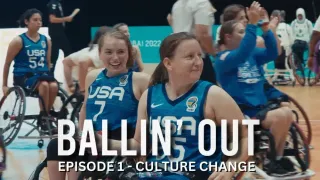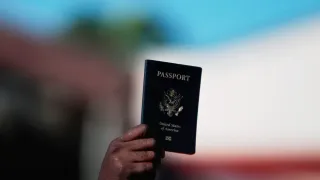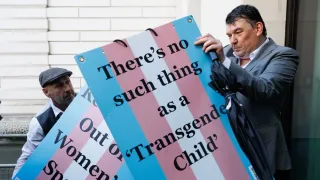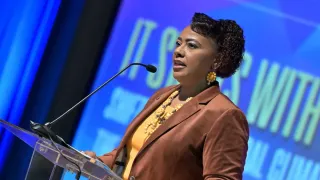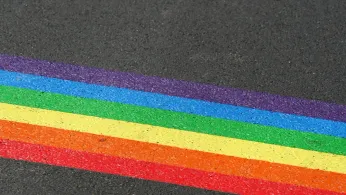
Oct 20
Arrests Made as Houston Removes Iconic Rainbow Crosswalks Amid Statewide Crackdown
READ TIME: 3 MIN.
Before dawn on Monday, October 20, 2025, Houston’s Montrose neighborhood—historically recognized as the heart of the city’s LGBTQ+ community—became the site of protest and arrests as city crews, flanked by police, began erasing the iconic rainbow crosswalks at the intersection of Westheimer and Taft. The removal followed a statewide mandate by Texas Governor Greg Abbott, who instructed cities to eliminate what he described as symbols of “political ideologies/agendas” from public infrastructure, including the rainbow crosswalks.
At approximately 2:30 a.m., construction crews arrived, only to find a small but determined group of protesters already gathered to protect the crosswalks. The activists, led by community organizers such as Joseph Panzarella, president of the Fourth Ward Super Neighborhood, engaged in peaceful protest—some singing, some reading, and others simply sitting in the intersection.
As the night progressed, law enforcement presence increased. Officers from the Houston Police Department (HPD) and METRO police formed a barrier between the protesters and the construction teams. At around 3:20 a.m., HPD’s Special Response Group arrived and began fencing off the intersection, giving repeated warnings to demonstrators to disperse. Despite the warnings, a handful of protesters remained, refusing to leave the crosswalk.
Just after 3:45 a.m., officers began making arrests. Three protesters were taken into custody, including Ethan Hale, a local activist and city council candidate. Supporters shouted words of encouragement as each individual was escorted away. Another individual was led from the scene but was not confirmed as arrested in initial reports.
The rainbow crosswalks, first installed in 2017, served not only as a symbol of LGBTQ+ pride but also as a memorial to community members lost to violence. Their presence in Montrose, a neighborhood central to Houston’s LGBTQ+ culture, carried deep significance.
Protesters and residents expressed frustration and disbelief at the removal. Daisa, a Montrose resident, told Chron, “I think it's stupid that we're arguing over paint in the street. I don't understand what the big deal is. Somebody died here. That's why it's here in the first place. It's disappointing and it feels like a waste of my tax dollars”.
Governor Abbott’s directive threatened to withhold state and federal funding from municipalities that failed to comply with the order, intensifying pressure on local officials. Houston Mayor John Whitmire acknowledged the state’s leverage, stating, “You can do away with the stripes, but you are not going to do away with the issue or the people that are valuable citizens of Houston”.
The removal of the Montrose rainbow crosswalks is part of a larger pattern of actions targeting LGBTQ+ visibility in Texas and across the United States. The crosswalks, repainted just last month after prior controversy, have become a flashpoint in a broader debate over public expressions of identity and inclusion.
Advocates argue that the removal sends a chilling message to LGBTQ+ Texans, particularly in a state where legislative efforts in recent years have included attempts to limit access to gender-affirming care and restrict LGBTQ+-inclusive curricula. “It’s not just about paint. It’s about the message that our community is welcome and valued here,” said one protester at the scene.
Others note the crosswalk’s origins as a memorial to a community member lost to violence, underscoring the intersection of public art, political expression, and remembrance within LGBTQ+ spaces.
As dawn broke over Montrose, the colorful stripes were gone, but the debate remains far from over. Local activists and community members pledged to continue fighting for LGBTQ+ visibility and inclusion in Houston and beyond. “Huge kudos to Houstonians that fought harder than our mayor did,” said organizer Joseph Panzarella, reflecting on both the night’s events and the broader struggle for LGBTQ+ rights in Texas.
For many, the crosswalk’s removal is a painful setback but also a rallying point. As one resident put it, “They can take away the paint, but they can’t erase who we are or what we stand for”.
The events of October 20, 2025, have reignited conversations about the role of public art, state power, and LGBTQ+ equality in Texas. With activists vowing continued resistance and local officials navigating state directives, Houston’s rainbow crosswalk saga reflects the ongoing challenges and resilience of LGBTQ+ communities nationwide.
